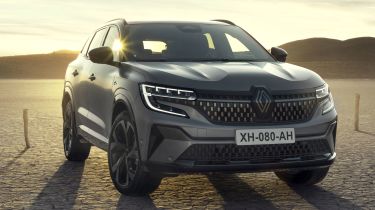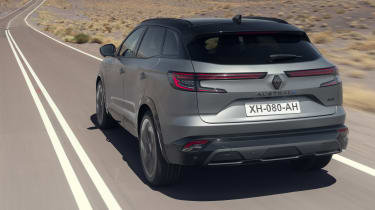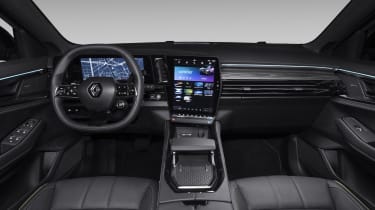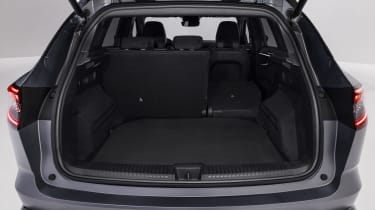New Renault Austral: hybrid-only Kadjar replacement unveiled
A range of mild-hybrid and full-hybrid engine options powers Renault’s new family SUV offering, which goes on sale later in 2022
Renault has revealed official pictures and full details of the new Austral – a hybrid-only replacement for the petrol and diesel-engined Kadjar family SUV. Like the Renault Arkana coupe-SUV, the Austral will be available with both mild hybrid and ‘E-TECH’ full hybrid petrol-electric engines.
A precise UK launch date and price for the Hyundai Tucson, Ford Kuga and VW Tiguan rival have yet to be confirmed, but Renault says order books will open in mid-2022, with sales starting in the autumn. The brand first announced the Austral name in early December 2021, describing it as "conjuring up the vibrancy and heat of the southern hemisphere and extending an invitation to explore," making it "an ideal fit for an SUV".
On the outside, the Austral displays Renault’s latest ‘sensual tech’ design language, consisting of “strong lines and sculpted forms”. There are LED light clusters front and rear, along with skid plates, contrasting side and sill guards and the higher ground clearance typical of SUVs. Alloy-wheel sizes from 17 up to 20 inches are available, while the car measures 1.62 metres high, 1.83 metres wide and 4.51 metres long, with a wheelbase of 2.67 metres. Seven colours are offered: Glacier White, Pearl White, Flame Red, Iron Blue, Diamond Black and Shale Grey, with two-tone schemes possible on higher specs.
The Austral will also be available as an ‘Esprit Alpine’ version, which brings some of the sporty styling and character of Renault’s high-performance sub-brand to the family SUV. Key features include a unique Satin Shale Grey paint finish, 20-inch alloy wheels, gloss-black styling highlights, special badging, Alcantara seat trim, blue stitching and blue-trimmed seatbelts. Esprit Alpine versions of other Renault models could be offered in due course, in similar fashion to the N Line versions of Hyundais or M Sport versions of BMWs.
Engines, performance, fuel economy and emissions
The Austral sits on the same mechanical platform as the latest Nissan Qashqai and Renault says it’ll “strike a perfect balance between behaviour, comfort, and handling for true driving pleasure”. However, we’ll have to wait until our first test drive to evaluate such claims.
What we can say for now is that it'll weigh less than 1,400kg in its lightest mild-hybrid form, thanks to partial use of aluminium in its construction, and that a total of five petrol-electric engines will be available – although not all of them will necessarily be offered in the UK. Optional four-wheel-steering (called ‘4CONTROL Advanced’ by Renault) promises greater stability at high speeds and better manoeuvrability in tight spaces.
The engine line-up kicks off with 138 and 158bhp 12v mild-hybrids. The former is available with either a manual or automatic gearbox, while the latter is automatic-only. Both feature regenerative braking and have ‘sailing’ capability – a term for when the engine is shut down as the car slows to a stop. Fuel economy for the 158bhp version is up to 46mpg, while CO2 emissions start from 136g/km.
There’s also a more advanced automatic-only 128bhp 48v mild-hybrid, which Renault describes as “the best alternative to diesel” – a fuel source formerly popular for family SUVs, but not used by any Austral. This combines a 1.2-litre turbocharged three-cylinder petrol engine with a 48v battery and starter motor. Renault says up to 53mpg fuel economy and from 123g/km CO2 emissions will be possible with this setup.
The full-hybrid E-TECH setup, meanwhile, is available in 158 and 197bhp guises. It uses technology already seen in the Renault Clio, Renault Captur and Renault Arkana models, with a pair of electric motors, a small 1.7kWh battery, a sophisticated seven-speed automatic gearbox and a regenerative braking system working in tandem with a conventional 1.2-litre three-cylinder turbocharged petrol engine.
According to Renault, the Austral E-TECH is capable of spending up to 80% of its time in electric mode in urban driving and offers a 40% reduction in fuel consumption compared to a petrol SUV driving in the same conditions. Claimed economy and emissions for the E-TECH are up to 61mpg and from 105g/km of CO2.
All versions of the Austral are available – either as standard or as an option – with a ‘predictive eco driving advice’ function. This promises to help you adopt a more fuel-efficient driving style by using either the instrument panel or head-up display to indicate the best time to release the accelerator pedal as you approach a bend, roundabout, speed-limit change, toll booth, crossroads or T-junction.
There's also a selection of driving modes, which Renault calls ‘MULTI-SENSE’ and which vary the steering effort, as well as the engine and chassis responsiveness – plus the interior lighting, temperature, instrument panel display and colour – according to the driver’s preference. There are three pre-programmed modes (Eco, Comfort and Sport) as well a fourth, called Perso, which lets you set each parameter individually. The optional Extended Grip Pack adds ‘Snow’ and ‘All Roads’ modes for tackling wintry or rough surfaces.
Interior and technology
Inside, the most notable feature is the ‘OpenR’ dashboard layout first seen in the Megane E-TECH electric car. This displays the driver’s instruments as well as navigation and multimedia across a pair of screens joined together to form a large L-shape, while a 9.3-inch head-up display is an integral part of the system. A high-end Harmon Kardon sound system is available as an optional upgrade for the standard audio setup.
The instrument-panel screen offers four display options: Classic (showing speed and revs), Navigation (showing maps), Zen (showing minimal information) and Road (showing a visualisation of the surrounding roads and traffic). The customisable dashboard display has five widgets – for fuel economy, tyre pressure, distance, eco-driving information and music – plus eight lighting colours. There’s also a central armrest with a built-in wireless charging pad, plus the option of a panoramic glass roof on the Techno trim and above.
The infotainment system is underpinned by Google’s Android Automotive software (although the screen can mirror both Android and Apple smartphones). Google apps such as Assistant, Maps and the Play app store can all be accessed through the dashboard screen. Touchscreen and voice controls are supported, as are over-the-air (OTA) software updates.
On the safety front, Renault says the Austral incorporates up to 32 different driver aids. These include the aforementioned head-up display, as well as adaptive cruise control with stop-and-go functionality, traffic-sign and speed-limit recognition, a 360-degree parking camera, automated parking assistance, lane-departure warning, blind-spot monitoring, lane-keeping assistance, front and rear autonomous emergency braking, rear cross-traffic alert and safe-exit alerts when opening the doors into traffic.
Boot space and practicality
The Austral is a five-seater SUV, and Renault says the reduction in buttons and controls normally found on the centre console results in a roomier feeling for front-seat occupants, who enjoy 150cm of elbowroom and 137cm of hip width. The outer rear seats and front passenger seat have ISOFIX child-seat mounting points.
The centre console is home to a spare-change tray, a pair of cupholders, a smartphone holder, a two-litre storage area under the armrest and a larger 3.6-litre bin under the console. There’s also a 6.4-litre glovebox, while the door bins measure 4.3 litres up front and 2.1 litres in the rear.
In the back, there’s just over 27cm of kneeroom and 90cm of head height, along with a removable central armrest with cup-holders, plus seatback pockets, while Renault also claims the Austral has among the widest door openings in its class. The rear bench seat splits and folds in a two-thirds/one-third arrangement, while two sections can be individually slid back and forth by 16cm and the angle of the rear seat backrests adjusts.
Boot capacity in the mild-hybrid is 500 litres, dropping to 430 in the E-TECH hybrid. These standard figures can be increased to 575 and 555 litres respectively using the seat-sliding mechanism described above. Access to the boot is via a powered tailgate (standard on Iconic and above, optional on Techno).
Most Popular

EV Deal of the Day: budget-friendly Ford Capri for just £234 a month





